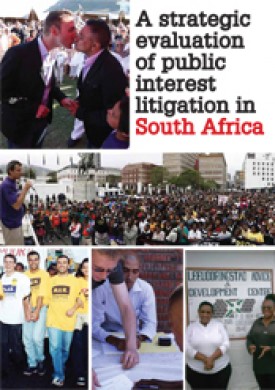Public Interest Litigation in South Africa Offers Lessons for Advocates
Resource type: Evaluation
The Atlantic Philanthropies |
Public interest litigation in South Africa faces several challenges but advocates can undertake four key strategies to enhance its success, according to this report by The Atlantic Philanthropies.
Atlantic this week publishes its report on strategic evaluation of public interest litigation in South Africa. This report will be of relevance to anyone interested in human rights, advocacy and the law generally. The full report can be downloaded below. It is a public document, so please feel free to distribute it widely.
Key findings in this report may be divided into three parts.
Challenges
We identified the key challenges facing the public interest litigation environment in South Africa:
- The major challenge facing the public interest litigation environment in South Africa is a lack of funding and resources. This challenge is also substantially responsible for the second major challenge, that is the inability of public interest organisations to attract and retain sufficient numbers of quality personnel.
- These challenges are matters of significant concern. As we have indicated, international research suggests that progressive constitutions and progressive judges – both of which South Africa undoubtedly possesses – are insufficient to achieve substantial progress on human rights unless there are sufficient resources to sustain “support structures” – in the form of rights advocacy organisations and rights-advocacy lawyers – for legal mobilisation.
- Given the massive inequality and poverty continuing to face South Africa, we are concerned that if organisations engaged in this work do not receive sufficient support, there is a danger that the gains of the last few years will be undermined.
Strategies
To achieve maximum impact, we have identified four strategies that should be used in combination in order to achieve social change:
- public information campaigns that inform ordinary people of their rights
- advice and assistance in order to enable people to claim their rights
- social mobilisation and advocacy, to assert rights both inside and outside the courts
- public interest litigation to enable poor or marginalised groups to achieve impact and success that would not otherwise be available to them
Success Factors
We concluded that in order to achieve social change via litigation, it is critical that the litigation be properly conceptualised, run and followed up. In this regard we identified seven factors that are essential to ensuring that public interest litigation succeeds and achieves maximum social change, including:
- proper organisations of clients
- overall long-term strategy through a series of cases, brought on different but related issues over a substantial period
- co-ordination and information sharing between multiple organisations with similar aims
- timing when the climate is right and until the relevant evidence is in place
- detailed research in advance of, and during, the litigation including using foreign law and international law
- the “characterisation debate” – ensuring that the case is brought under the appropriate right and is correctly pitched to the court
- proper follow-up and enforcement after the litigation ensuring practical benefits for those not directly involved in the litigation at all
South Africa’s Constitution is one of the most progressive in the world. It includes powerful and far-reaching provisions, including those related to socio-economic rights. Yet South Africa also continues to face massive inequality and poverty. It is therefore essential that the Constitution is used in a manner that produces tangible and lasting social change.
